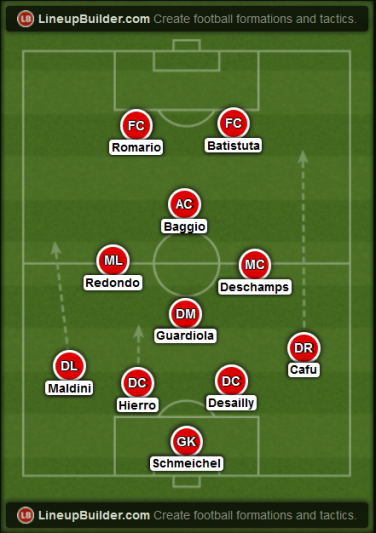Manager: Alex Ferguson
Bench: van der Sar, Kahn, Chilavert; Lizarazu, Zanetti, Irwin; Blanc, Baresi, Costacurta, Aldair, Adams, Kohler; Thuram, F. de Boer, Ferrara; Dunga, Keane, Albertini; Sammer, Matthäus, Seedorf; Laudrup, Litmanen, Möller; Hässler, Zidane, Giggs; Bergkamp, Klinsmann, Shearer; Ronaldo, Weah, Cantona
Best player: Paolo Maldini
Best club: Juventus Turin
Best team: AC Milan 1991-1994
Best match: Juventus Turin – AC Milan, Serie A, 1991-92
A preliminary remark: when people compile Teams of the Decade, they most often restrict the meaning of the term ‘decade’ to something like the 80s or the 90s. I don’t. When I say ‘decade’, I simply mean a time span of 10 years. This post is the fourth in a series of articles in which I compile Teams of the Decade. I will work my way back in time in 5 year steps. After this post, the next one will be about the 1985-1995 Team of the Decade, the last one was about the 1995-2005 Team of the Decade. I’ll work my way back in time until the 1950-1960 Team of the Decade. I will stop there because the lack of footage for players before 1950 makes it impossible for me to form an opinion about them that is truly my own. I chose to go back in steps of 5 years, because that seems to be a good compromise. Going back in steps of 10 years is unfair towards those players who have performed the best around the turn of a decade (take Xavi, for example). Smaller steps would mean a lot of repetition: the 2004-2014 Team of the Decade won’t be that different from the 2005-2015 Team of the Decade.
Inclusion in this team is based solely on quantity and quality of performance during the respective period of time. It’s not about whether a player has won a lot of trophies, or fits some artistic ideal, even whether a player was ahead of his time in itself isn’t a criterion. It’s about performance and performance alone. You don’t necessarily have to get top marks for both quantity and quality of performance to be included. If the quality of your performances was outstanding, you will have a chance to be included even if, for example, you only performed on that level for, say, 5 of the 10 years. But the lack of quantity of performance will speak against you. Also, the chances of any given player to be included, of course, heavily depend on the quality and quantity of performance of other players who played in the same position during the same period of time. This is all still a bit vague, but since fantasy football teams are far from being exact science to begin with, I think that’s okay. The main point that I want to emphasize is that both quantity and quality of performance matter. I define the 1990-2000 decade as starting with the final whistle of the 1990 European Cup final and ending with the final whistle of the 2000 Champions League final.
Peter Schmeichel
The 90s were the time of the burly ‘reaction keeper’ and Peter Schmeichel is no exception to that rule. He not only stuck to the basics of goalkeeping but excelled at them. Stopping shots was probably his greatest quality, as exemplified by several YouTube highlight reels. He had very quick reflexes and was outstanding in one-on-one situations. In a nutshell, he was the Danish Oliver Kahn.Read More »
